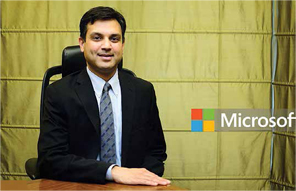
Anant Maheshwari will take over the operations of the company from Bhaskar Pramanik, according to software major Microsoft. Pramanik, who is currently the chairman, Microsoft India, will retire in March 2017. Maheshwari took charge on September 1 as president, Microsoft India and will take over from January next year. Currently, he is president at Honeywell India. He was appointed the president of Honeywell India in January 2014, after serving various roles in the company for 10 years. As president of Microsoft India he will be responsible for all of Microsoft’s product, service, and support offerings across the country and also be responsible for continuing the company’s transformation into the leading productivity and platform company for the mobile-first, cloud-first era. “As we continue to transform as an organisation and to support our customers’ digital transformation, Anant’s leadership will be pivotal to our continued growth. Our mission at Microsoft, which we all care deeply about, is to enable every person and every organisation on the planet to achieve more. I know that in India, Anant will help us to continue to deliver against this, in one of the most vibrant, diverse and exciting markets anywhere in the world,” said, Jean-Philippe Courtois, EVP and President of Microsoft Global Sales, Marketing & Operations in a statement. Pramanik, prior to becoming chairman of Microsoft India in 2011, was managing director for Oracle India and managing director at Sun Microsystems. Reacting to the change of guard, Pramanik said, “I am privileged to have participated in the growth of the Indian IT industry over the last four decades from the days of mainframe computing to the mobile first-cloud-first world of today where computing is all pervasive. I have seen the Indian IT industry grow from a few million dollars to the $200b global behemoth that it is today”.

Found everywhere, Parle-G biscuits aren’t being rolled out from the Vile Parle plant any more, as the unit has been shut down by its owners, the Vijay Chauhan Family. Citing the reason for shutting down the unit, which is nearly 90 years, old, Arup Chauhan, Parle Products executive director stated that the production at the time of the closure was negligible and didn’t make commercial sense to keep it running. The Rs.10,000-crore Parle Products has manufacturing units across India that make Parle-G and other biscuit and candy brands. At the time of the shutdown of the plant, which at its peak produced the largest volume of biscuits, there were around 300 workers, who have all taken VRS. Chauhan described the VRS process as smooth. Spread across about 10 acres, the factory houses Parle Products’ HQ. Although Chauhan did not divulge details, the closely-held Parle Products, named after the western suburb, is likely to retain the land—which sits on a prime location amid a host of residential complexes— for development. According to experts, the going rate for residences in Vile Parle is between Rs.25,000 and Rs.28,000 per sq ft .

Dilip Rath takes charge as the chairman of National Dairy Development Board (NDDB), after the Department of Personnel and Training (DoPT), Government of India gave him the additional charge of the post until the appointment of a regular incumbent. The chairman’s post fell vacant last week after T Nandakumar resigned before his five-year term ended.
Rath is currently the managing director of NDDB. Holding an MA degree in Economics from Jawaharlal Nehru University (JNU), Rath went on to complete his MSc from the London School of Economics. He joined the IAS in 1979 and served in different capacities under the state governments of West Bengal and Odisha. He was also the joint secretary in the Department of Animal Husbandry, Dairying and Fisheries, GoI from 2008-10. As a mission director of the National Dairy Plan (NDP), Rath is involved in project conceptualisation and formulation of NDP. He was instrumental in implementing various schemes of the Central Government including being the divisional head of 12 cattle development organisations.
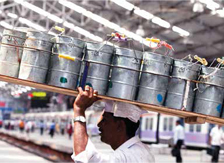
International motivational speaker and former CEO of Mumbai Dabbawalas Dr Pawan Agrawal, shared the success story of Dabbawalas, Mumbai’s tiffin delivery empire, at a programme held in the New Delhi recently. While talking at a function sponsored by Ace International Business School and organised by HVPP, Agarwal also provided the young audience with tips about establishing businesses and achieving success in life. “The story of Dabbawalas is an extraordinary source of learning. It may be surprising that from something as small as delivering tiffin boxes you can learn so many things. Dabbawalas, commitment to the work and their dedication to their customers show optimum level of professionalism from people who are mostly illiterate,” said Bijaya Timilsina, the principal of Ace Business School, at the event. “Today people are always complaining about the lack of resources, so we wanted to share the story of Dabbawalas, who, despite having very limited resources, are providing world-class service,” he further added. The century-old Mumbai Dabbawalas, provides employment to 5,000 people and delivers 2,00,000 tiffins boxes every day. The organisation has been recognised all over the world for their passion, dedication and accuracy in delivering exemplary service to their customers.
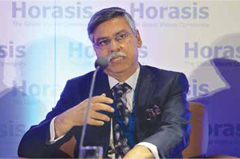
Delhi-based Hero Group has realigned businesses between brothers Pawan and Sunil Munjal. According to sources, Sunil Munjal, 55, stepped down as joint managing director of Hero MotoCorp Ltd, India’s largest motorcycle maker, to lead the group’s ventures in defence and power. Commenting on the reshuffle, his elder brother, Pawan, chairman and chief executive officer of Hero MotoCorp, said the move will further stimulate the immense diversification opportunities that the Hero Group envisions for itself, while enabling family members to pursue their own aspirations. He himself will continue to focus on the group’s auto business. The new ventures will be spearheaded by Sunil Munjal’s company, Hero Corporate Service Ltd. “It’s a family decision and nobody else has any role to play. The group now wants to diversify aggressively and it wants to focus on high-growth business areas,” said sources. In a statement, Sunil said, the entire Munjal family believed the Group’s diversification drive needs a fillip to accelerate growth. “This is also an exciting time for me to consolidate and strengthen some of the existing businesses and to explore new opportunities that are close to my heart,” his statement said.
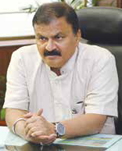
Guruprasad Mohapatra has been appointed as the chairman of the Airports Authority of India (AAI). An Odisha- born bureaucrat, Mohapatra is from the 1986-batch Gujarat cadre IAS officer. Prior to this assignment, Mohapatra was posted as Joint Secretary in the Union Ministry of Commerce and had served as Municipal Commissioner of Ahmedabad for over three years. After about two years of his tenure as Joint Secretary, he was appointed the Chairman of AAI. An MA in Political Science and MPhil in Diplomacy (International Relations), Mohapatra is also an MBA degree holder. He hails from Niali area and is the youngest son of noted litterateur the late Mohapatra Nilamani Sahoo. He had a long stint in the power sector, where he was involved in comprehensive reforms in the power sector and restructuring of the erstwhile Gujarat Electricity Board into several commercial entities. He also served in the sales tax department as Special Commissioner (Enforcement) and Commissioner of Commercial Taxes and as the Commissioner of Transport, besides as the Joint MD of Gujarat Industrial Development Corporation (GIDC) during his service in Gujarat.
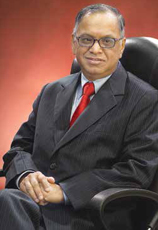
One of the flagship programmes of the government is far, far away from having smart cities, according to Infosys co-founder NR Narayana Murthy who said engineers prefer bigger cities for work. “In my own company, we have built development centres in Mysore, Bhubaneshwar, Thiruvanantapuram, These are not rural centres, second-tier cities . They are not occupied more than 50 percent,” he said at an event recently. "Nobody wants to go there. Everybody wants to be in Mumbai, Pune, Bengaluru, Hyderabad, Noida. That is the reality,” he said, while replying to a question on whether we can aspire to contain the massive urbanisation. Murthy said. “jobs for spouses, children’s education and quality healthcare are among the prime reasons why the company faces this problem. Interestingly, the comment from the former chairman of the IT company comes even as government has been nudging IT and IT-enabled companies to go deeper into the country in order to create jobs all across. He spoke on urban systems during a lecture in which he stressed that India needs to work keeping in mind that mass-scale migration will continue in the times ahead”. He added, none of the high-income countries have progressed without urbanisation. “To take care of this, we will need to create jobs in the services and the manufacturing sector,” he emphasised. He went to add, “which is why our country is far, away from its ambition of having smart cities. Since we are far, far away from smart cities, I did not talk about it”. Replying a question on why he excluded any mention of the government initiative in his over one-hour lecture on the topic ‘City Systems’. “I am a doer, I am not just a talker,” he said, asking the audience to visit Infosys campus in Mysore to have a taste of what a smart city can be.

Kedar Upadhye joins as global chief financial officer (CFO) of Cipla. Until recently, Kedar was vice-president, Global Generics Finance, and Head of Investor Relations in Dr Reddy’s Laboratories, according to a release issued by Cipla. Prior to Dr Reddy’s, he worked with Pepsi India and Thermax Group, it added. Commenting on the appointment, Cipla MD and Global CEO Subhanu Saxena said, “With his strong financial expertise and deep insights about the global generics industry, he shall be a strong addition to our management council to help us move forward towards our aspirations.” Cipla added that Umang Vohra will continue as the global chief operating officer of the firm.
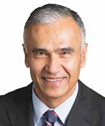
The former managing director and CEO at Cairn India, Mayank Ashar joins the Mukesh Ambani- promoted Reliance Industries as adviser refinery and marketing business. Ashar would be reporting to Hital R Meswani, who is an executive director on the board of RIL, according to an email sent to the company’s top brass last week. Ashar, who is also known as Mike in the industry, left Cairn India, citing personal reasons. He had joined Vedanta Group company Cairn in the year 2014 and quit the firm in 2016. The 60-year-old executive’s exit from the Vedanta Group company came at a time when the oil explorer has been performing poorly, following the collapse in crude oil prices. Ashar has been trying to get the lease for the Barmer oil and gas block extended by another 10 years beyond 2020. Ashar has over 36 years of rich and exhaustive experience in the international oil and gas industry through various senior management and top leadership roles in leading global companies such as British Petroleum, Petro-Canada and Suncor Energy. Ashar brings a rare mix of driving corporate strategy and on-ground execution, Cairn said in the notice. He also served as the chief executive officer and president at Irving Oil Limited. He holds a bachelor in Chemical Engineering, a BA in Philosophy and Economics, a Master’s of Engineering and an MBA from the University of Toronto.
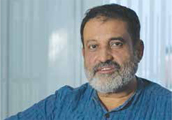
Ten percent of incremental jobs in India’s IT sector will disappear because of increasing automation that will shave off middle-level managers in the era of artificial intelligence, according to industry veteran T V Mohandas Pai. “I think in the IT sector, maybe 10 percent minimum of incremental jobs that are created will disappear. That means every year if they do (create) two to 2.5 lakh jobs, 25,000-50,000 jobs will disappear,” said the former CFO and HR Head at Infosys. According to him, middle-level managers account for 10 percent or 450,000 people of the 4.5 million (45 lakh)-strong IT industry in India. Half of them (2,25,000) would lose jobs over the next one decade as their work would get automated. “There are lots of people (middle-level managers) earning between Rs.30 lakh and Rs.70 lakh (per annum). Half of them will lose their jobs in the next 10 years,” Pai said while talking to the media. The tech investor said the new breed of IT engineers should have better skills and deep technical knowledge, adding, prospects for those having just a bachelor’s degree (B. Tech) are going to be less and less in IT. Stressing that IT hiring would become more and more specialised with companies looking for higher and greater levels of expertise, Pai said he would recommend aspirants to do master’s (post-graduation). “An ordinary B.Tech is like X standard today because you have to go ahead for the next 30 years,” the chairman of Manipal Global Education said. He said automation, machine-learning (artificial intelligence) and robotics would create a new kind of specialised workforce. “People who have got skills in artificial intelligence, machine learning and new coding languages like Python, Android and those in the mobile area would do very well in the next five years,” he stressed.
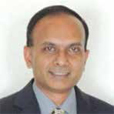
Former Bharti Axa General Insurance Company CEO and MD Deepak Iyer takes charge of confectionery major Mondelez International as managing director of its India operation. Iyer, as MD of Mondelez India Foods will be part of the Asia Pacific Leadership Team and report into Maurizio Brusadelli, EVP & President, Asia Pacific, Mondelez International. He replaces Chandramouli Venkatesan, who led the business as managing director for close to two years and was with the company for more than a decade, according to a statement issued by the company. “We are delighted to welcome Deepak to Mondelez International. Deepak joins us with over 20 years of management experience spanning sales, marketing, R&D, franchise management and general management. He also comes with extensive experience in the FMCG space in India,” Brusadelli said. Prior to Bharti Axa, Iyer was the CEO and managing director of Wrigley India. He has also worked with Pepsico for 17 years across different roles and in different markets.
By Joe Williams